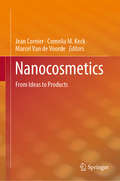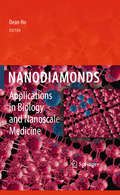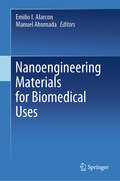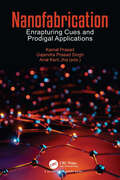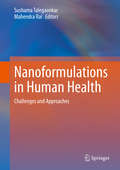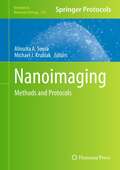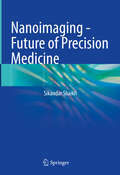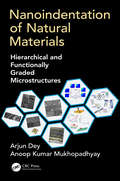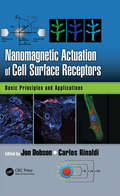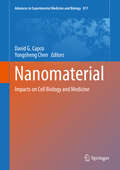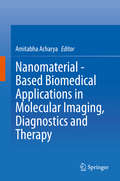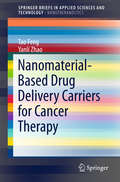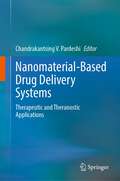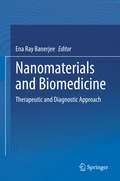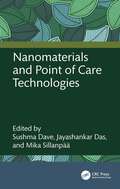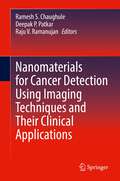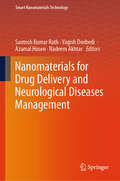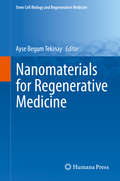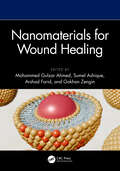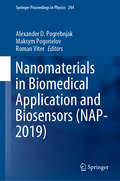- Table View
- List View
Nanocosmetics: From Ideas to Products
by Marcel Van de Voorde Jean Cornier Cornelia M. KeckThis book addresses the application of nanotechnology to cosmetics. Edited by three respected experts in the field, the book begins with a general overview of the science behind cosmetics and skin care today, and of the status quo of nanotechnology in cosmetics. Subsequent chapters provide detailed information on the different nanoparticles currently used in cosmetics; the production and characterization of nanoparticles and nanocosmetics; and regulatory, safety and commercialization aspects. Given its scope, the book offers an indispensable guide for scientists in academia and industry, technicians and students, as well as a useful resource for decision-makers in the field and consumer organizations.Chapter 6 of this book is available open access under a CC BY 4.0 licence at link.springer.com.
Nanodiamonds
by Dean HoNanodiamonds: Applications in Biology and Nanoscale Medicine highlights the translation of nanodiamonds toward clinical relevance and medical applications. Integrating a spectrum of internationally-recognized experts currently developing these technologies, this book fits as a cornerstone of this exciting field. These include contributions from clinician scientists working at the interface of medicine and nanotechnologies which discuss the critical and requisite properties of nanomaterials, in a concise and cohesive manner. Nanodiamonds: Applications in Biology and Nanoscale Medicine provides a multidisciplinary overview of nanodiamonds and there uses for scientific, engineering and clinical audiences alike.
Nanoelectromechanics in Engineering and Biology (Nano- and Microscience, Engineering, Technology and Medicine)
by Michael Pycraft HughesThe success, growth, and virtually limitless applications of nanotechnology depend upon our ability to manipulate nanoscale objects, which in turn depends upon developing new insights into the interactions of electric fields, nanoparticles, and the molecules that surround them. In the first book to unite and directly address particle electrokinetics and nanotechnology, Nanoelectromechanics in Engineering and Biology provides a thorough grounding in the phenomena associated with nanoscale particle manipulation. The author delivers a wealth of application and background knowledge, from using electric fields for particle sorting in lab-on-a-chip devices to electrode fabrication, electric field simulation, and computer analysis. It also explores how electromechanics can be applied to sorting DNA molecules, examining viruses, constructing electronic devices with carbon nanotubes, and actuating nanoscale electric motors. The field of nanotechnology is inherently multidisciplinary-in its principles, in its techniques, and in its applications-and meeting its current and future challenges will require the kind of approach reflected in this book. Unmatched in its scope, Nanoelectromechanics in Engineering and Biology offers an outstanding opportunity for people in all areas of research and technology to explore the use and precise manipulation of nanoscale structures.
Nanoengineering Materials for Biomedical Uses
by Emilio I. Alarcon Manuel AhumadaThis book fills the gap between fundamental and applied research in the use of nanomaterials in biomedical applications, covering the most relevant areas, such as the fundamental concepts of the preparation of nanostructures and regulatory requirements for their safe use in biomedical devices. It also critically discusses what has been achieved in the field, and what needs to be urgently addressed and reviews the state-of-the-art medical uses of nanomaterials for treating damaged organs and tissues.Combining the expertise of clinical researchers working in the field of tissue engineering and novel materials, the book explores the main topics regarding the characterization of materials, specific organ-oriented biomaterials and their applications, as well as regulations and safety. Further, it also examines recent advances, difficulties, and clinical requirements in terms of human bone, cornea, heart, skin and the nervous system, allowing readers to gain a clear and comprehensive understanding of current nanomaterial use in biomedical applications and devices, together with the challenges and future trends.This book is a valuable tool for multidisciplinary scientists and experts interested in fundamental concepts and synthetic routes for preparing nanomaterials. It is also of interest to students and researchers involved in cross-disciplinary research in nanomaterials for clinical applications and offers practical insights for clinicians as well as engineers and materials scientists working in nanoengineering.
Nanofabrication: Enrapturing Cues and Prodigal Applications
by Kamal Prasad Gajendra Prasad Singh Anal Kant JhaNature, with its unassuming yet prodigious character, unfolds its assembly and adaptability guided by the principles of thermodynamics and supramolecular chemistry. Every entity in nature, regardless of its form, adheres to these fundamental principles. From individual metabolites to ordinary molecules, each possesses inherent potential for nanomaterial synthesis. This book meticulously compiles diverse green approaches that highlight nature's synthetic prowess and its lavish abundance in nanomaterial synthesis, showcasing potential applications. It unveils the lucrative pathways nature provides for cutting-edge advancements in synthetic methodologies and material applications.
Nanoformulations in Human Health: Challenges and Approaches
by Mahendra Rai Sushama TalegaonkarThis book is an amalgamation of knowledge, experience, and expertise in various aspects of nanotechnology, by experts who are proficient in designing of novel nanoformulations that are used in the treatment of various challenging and prevalent diseases. It is an exhaustive compilation of the multi-faceted arena of nanoformulations and the healthcare system that caters to the needs of academicians, scholars, researchers etc. The most important aspect of the book covers various types of nanoformulations and their applications in treatment of communicable and non-communicable diseases. Each chapter focuses on a particular nanoformulation as well as a disease including the pathophysiology of the disease, the current treatment modalities of diseases, the role of nanoformulation in treatment and other future aspects and directions for further work. Coverage includes neuropathic pain, colon targeting, nose-to-brain drug delivery, skin cancer, arthritis and tuberculosis.
Nanoimaging
by Michael J. Kruhlak Alioscka A. SousaFor more than a century, microscopy has been a centerpiece of extraordinary discoveries in biology. Along the way, remarkable imaging tools have been developed allowing scientists to dissect the complexity of cellular processes at the nano length molecular scales. Nanoimaging: Methods and Protocols presents a diverse collection of microscopy techniques and methodologies that provides guidance to successfully image cellular molecular complexes at nanometer spatial resolution. The book's four parts cover: (1) light microscopy techniques with a special emphasis on methods that go beyond the classic diffraction-limited imaging; (2) electron microscopy techniques for high-resolution imaging of molecules, cells and tissues, in both two and three dimensions; (3) scanning probe microscopy techniques for imaging and probing macromolecular complexes and membrane surface topography; and (4) complementary techniques on correlative microscopy, soft x-ray tomography and secondary ion mass spectrometry imaging. Written in the successful format of the Methods in Molecular BiologyTM series, chapters include introductions to their respective topics, lists of the necessary materials and reagents, step-by-step protocols, and notes on troubleshooting and avoiding known pitfalls. Authoritative and accessible, Nanoimaging: Methods and Protocols highlights many of the most exciting possibilities in microscopy for the investigation of biological structures at the nano length molecular scales.
Nanoimaging - Future of Precision Medicine
by Sikandar ShaikhThe book covers all the aspects of the advances in nanoimaging. It provides a step-by-step overview of the various aspects of nanoimaging from the basics like nanoparticle production. It describes the different applications of nanoparticles across multiple imaging modalities and their applications in oncology, cardiology, neurology, infection and inflammation and many other conditions. The book also covers the detailed use of the different modalities like ultrasound, CT, MRI, PET-CT, PET-MRI, and nuclear medicine for various conditions. It describes various nanoparticles, nano biomarkers and nanoprobes used for multiple applications. Several chapters provide detailed information on the molecular level. Additionally, the book discusses nano theranostics - a newer concept used in molecular imaging for diagnosing the disease and its therapeutic purpose. It provides basic and detailed information on the use of nanoimaging in various conditions and pathologies along with therapeutic options. The book is helpful for residents, fellows, students and various specialists, such as radiologists, molecular imaging specialists, molecular biologists, oncologists, hematologists, surgeons, biomedical engineers, and various specialities involving the use of nanoimaging.
Nanoindentation of Natural Materials: Hierarchical and Functionally Graded Microstructures
by Arjun Dey Anoop Kumar MukhopadhyayNanoindentation of Natural Materials: Hierarchical and Functionally Graded Microstructures provides a systematic introduction and review of state-of-the-art statistical hierarchical and functionally graded structures found in bone, teeth, hair, and scales, from a nanoindentation perspective, including detailed microstructure and composition. It covers the basics of hierarchical and functionally graded structures and nanoindentation techniques and detailed discussion with correlation micro/nano mechanical-structures The book includes practical issues backed with experimental data
Nanomagnetic Actuation in Biomedicine: Basic Principles and Applications
by Jon Dobson Carlos RinaldiThe manipulation and control of cells and sub-cellular structures through magnetic nanoparticle-based actuation is a relatively new technique that has led to novel and exciting biomedical applications. Nanomagnetic actuation is being used in laboratory studies of stem cells to determine how these mechanical cues can be used to control stem cell differentiation for regenerative medicine applications. This book explores this rapidly expanding field. It will interest industry bioscientists and biomedical engineers as well as academics in cellular biomechanics, cell and tissue engineering, and regenerative medicine. Key Features Focuses on the fundamentals and applications of magnetic actuation Includes contributions by world-class researchers from several countries and is edited by a well-known researcher in this field Offers multidisciplinary coverage and applications Supplies extensive references at the end of each chapter
Nanomanufacturing Techniques in Sustainable Healthcare Applications (Advances in Manufacturing, Design and Computational Intelligence Techniques)
by Arbind Prasad and Pramod KumarThe text begins by discussing the processing and characterization of nano-manufactured resorbable bionanocomposites and presents the latest advances in carbon-based polymer nanocomposite materials for sensing applications. It further presents different characterization techniques such as scanning electron, transmission electron, atomic force microscopy, and powder X-ray diffraction for the identification of bionanocomposites.This book:• Introduces nano-manufactured processed composites for biomedical application, processing, and characterization of bionanocomposites.• Presents biobased nano-manufactured processed composites for imaging, tissue repairing, and drug-delivery applications.• Explains future trends of nano-manufactured composites in 3D bio-implants and fluorescent bioimaging.• Highlights the challenges and perspectives of polymeric nano-manufactured composites for biomedical applications.• Covers multifunctional nano-manufactured bio-composites, and advances in polymeric membranes for healthcare applications.It is primarily written for senior undergraduates, graduate students, and academic researchers in the fields of manufacturing engineering, biomedical engineering, materials science and engineering, mechanical engineering, and production engineering.
Nanomaterial
by David G. Capco Yongsheng ChenThe rapidly developing field of nanomaterials has expanded in many commercial areas. More recent studies have begun to provide a foundation for understanding how nanomaterials influence cells and how they also can serve as methodological tools for studies in medicine and cell biology, including research into stem cells. Recent investigations have shown affects of nanomaterials on specific subcellular structures, such as the actin-based brush border network in cells with an increasing emphasis on the barrier function of epithelial tissues. While other studies have shown involvement of nanoparticles in specific cytoplasmic signal transduction events such as the rise in intracellular free calcium, a signaling event known to regulate many changes in cell architecture and function. In parallel, nanomaterials are increasingly used in medicine for drug delivery, treatment of cancer and an increasing number of new applications. This book investigates these areas and also includes new methods for assessment in cell biology and medicine.
Nanomaterial - Based Biomedical Applications in Molecular Imaging, Diagnostics and Therapy
by Amitabha AcharyaThis book comprehensively reviews the recent advances in nanomaterial-based molecular imaging, diagnostics, and personalized therapy. It discusses the novel biocompatible fluorescent nanomaterials, their synthesis, and modern state of art characterization, as well as the various strategies for immobilization of biomacromolecules on the nanomaterial surface and approaches for increasing their stability. In addition, the book describes the synthesis of lectin nanoconjugates using different types of biocompatible raw materials and their systematic characterization. Lastly, it presents our current understanding of the biomolecular carona, which affects nanoparticle-based targeted drug delivery, and examines the conceptual approaches to improve the in-vivo efficacy of targeted drug delivery.
Nanomaterial-Based Drug Delivery Carriers for Cancer Therapy
by Tao Feng Yanli ZhaoThis brief summarizes different types of organic and inorganic nanomaterials for drug delivery in cancer therapy. It highlights that precisely designed nanomaterials will be the next-generation therapeutic agents for cancer treatment.
Nanomaterial-Based Drug Delivery Systems: Therapeutic and Theranostic Applications
by Chandrakantsing V. PardeshiEffective drug delivery systems are essential in maximizing the therapeutic effects of the drugs in question. This book thoroughly analyses recent technological advances in new, nanomaterial-based drug delivery systems for the diagnosis and treatment of various diseases. These systems also have diverse applications in pharmaceutical, biomedical, biomaterial, and biotechnological fields. This book explains the different types of nanocarriers currently in development and covers both therapeutic and theranostic applications of drug-loaded nanocarriers and nanomedicine.Clinical research professionals, industrial pharmaceutical scientists, and veteran drug delivery developers benefit from the unique structure of this book, making it essential for the drug delivery researcher. Students, research scholars, and industrial professionals alike benefit from the current technological advancements, regulatory aspects, and the history of discovery and development in the field of nanomedicine presented in this book.
Nanomaterials and Biomedicine: Therapeutic and Diagnostic Approach
by Ena Ray BanerjeeThis book comprehensively reviews the history of nanotechnology, and describes the physiochemical properties of various nanoparticles and their biomedical applications. Covering the biotoxicity of nanoparticles, their bio-distribution and release kinetics, and their role in diagnosis, pre-clinical drug discovery and disease prevention, it also examines the application of nanoscaffolds in tissue engineering and as cell culture templates. Further, the book discusses several fabrication methodologies for regenerative medicine, and explores nanotechnology-based stem cell therapeutics, including stem cell transfection, stem cell delivery, and stem cell expansion for promoting tissue regeneration. Lastly, it addresses the use of DNA barcoding technology from nanosamples for the detection, identification and validation of emerging pathogens, biodiversity and ancient remnants of living specimens, and highlights various strategies for the plant-mediated synthesis of nanoparticles. Given its scope, it is a valuable reference resource for graduate students and researchers interested in understanding the diverse range of biomedical applications of nanoparticles.
Nanomaterials and Nanocomposites Exposures to Plants: Response, Interaction, Phytotoxicity and Defense Mechanisms (Smart Nanomaterials Technology)
by Azamal HusenThis book looks at the interaction between plants and nanomaterials/nanocomposites, and their effects ecology, the food chain and human health. It focuses on nanomaterials/nanocomposites phytotoxicity, which is an important precondition to promote the application of nanotechnology and to avoid the potential ecological risks. It describes the influencing factors of nanotoxicity of nanomaterials and the mechanisms of these toxic effects and defense mechanisms in plants. The chapters in this book are written by internationally renowned researchers and professionals and provides exciting and remarkable information (on the above-mentioned topics) to the scientist, researcher and student working field of plant biology, agricultural science, nanobiotechnology, plant biochemistry, plant physiology, plant biotechnology and many other interdisciplinary subjects.
Nanomaterials and Point of Care Technologies
by Sushma Dave Jayashankar Das Sillanpää MikaPoint of care (POC) diagnostic devices are predominantly used for the diagnosis and monitoring of diseases. To make these technologies scalable for manufacturing, user-friendly, inexpensive, sensitive, and rapid, a combination of such devices with nanomaterials is required. This book deals with new emerging fields such as POC technologies and advanced nanotheranostics using nanomaterials and their technologies and applications in diagnosis. In this book, current advances for the application of nanomaterials such as carbon nanotubes, graphene, and magnetic nanoparticles in POC devices and future directions are reviewed.This book: Presents a comprehensive account of needs and challenges of POC diagnostics Describes the fundamentals of rationale of nanomaterials as remarkable building blocks for biosensing Discusses development of critical diagnosis in POC systems Deals with the advantages of nanomaterial-based sensing strategies Illustrates the challenges and breakthroughs of technologies for cost-efficient biosensing platform The book is aimed at researchers and professionals in nanotechnology and biomedical engineering.
Nanomaterials and Supramolecular Structures
by Petr Petrovych Gorbyk Anatoliy Petrovych ShpakThe text features experimental investigations which use a variety of modern methods and theoretical modeling of surface structures and physicochemical processes which occur at solid surfaces. Nanomaterials and Supramolecular Structures: Physics, Chemistry, and Applications is intended for specialists experienced in the fields of Nanochemistry, Nanophysics, Surface Chemistry (and Physics), synthesis of new nanostructural functional materials and their practical applications. It will also prove useful to students, post-graduates, researchers, and lecturers.
Nanomaterials for Biomedical and Bioengineering Applications
by Jen-Tsung Chen Rabia Javed Ali Talha KhalilThis book accumulates the most recent advancements in the field of bioengineering regarding hybrid science named nanobiotechnology and enriches the readers with vast and comprehensive knowledge about different biomedical applications of nanomaterials. It includes drug and gene delivery, tissue engineering, antimicrobial properties, hyperthermia, cancer therapy, bioimaging, biosensing, photoablation therapy, etc., utilizing the potential of different nanomaterials that are helpful for the well-being of diseased individuals. Furthermore, the concerns about multidrug-resistant microorganisms are increasing daily in the healthcare system. Since conventional therapies fail to combat various infectious diseases, novel nanotechnology techniques provide an alternative approach to developing innovative biomaterials. The novel features of nanomaterials need to be exploited for use in the biomedical engineering domain. They should be fabricated so that the novel multifunctional nanomaterials notonly improve drug efficacy but also reduce their side effects. Moreover, a detailed understanding of the nanotoxicological effects of promising biomedical nanomaterials should necessarily be explored using the cell culture approach. Corona of nanomaterials should be investigated in detail to determine its fate in the biological system regarding safety concerns. This is the most important feature that is novel and explored in this book and would be very helpful for customers like clinicians, scientists, engineers, and technicians who will gain extensive knowledge from this book and work together to get the desired results in the healthcare sector.
Nanomaterials for Cancer Detection Using Imaging Techniques and Their Clinical Applications
by Ramesh S. Chaughule Deepak P. Patkar Raju V. RamanujanThis book presents nanomaterials for cancer detection using a variety of state-of-the-art imaging techniques. Clinical applications are also highlighted. The unique size-dependent properties and convenient surfaces for molecular assembly make these nanomaterials essential for a variety of innovative imaging techniques. This book covers important imaging modalities, synthesis of nanoparticles with specific functional properties, and clinical applications including the development of anticancer drugs. The information presented here involves contributions from chemistry, materials science, materials characterization, cell engineering, and clinical testing.The book will be essential reading to experienced clinicians as well as a wide range of scholars and researchers interested in nanotechnology and imaging techniques for cancer detection.
Nanomaterials for Drug Delivery and Neurological Diseases Management (Smart Nanomaterials Technology)
by Nadeem Akhtar Azamal Husen Vagish Dwibedi Santosh Kumar RathThis book gives a complete overview of current developments in the nano drug delivery technology in the management of neurological disorders and brain diseases. The book is divided into three main sub-sections: A) Fundamental study on nanomaterials, nanocarriers, and nanoformulation-based drug delivery in neurological diseases management, B) Nano drug delivery therapy - a novel approach towards common neurological disorders and C) Novel nano delivery strategies in targeted neurological diseases management. This collective work presents diverse nano-based drug delivery technologies that are high-throughput, reliable, pioneering, and applicable to researchers of different countries despite their socio-economic conditions. It hopefully encourages researchers, innovators and policymaker to adapt nanomaterial-based drug delivery vehicles technologies using diverse nano-based formulation techniques as targeted therapy for treating and managing neurological disorders.
Nanomaterials for Regenerative Medicine (Stem Cell Biology and Regenerative Medicine)
by Ayse Begum TekinayThis book covers a broad range of therapeutic applications of nanomaterials that are used for regenerative medicine applications, including neural regeneration, cartilage regeneration, wound healing, dental regeneration and implants, and immunomodulation. Chapters are contributed by leading experts in the field and cover concepts for developing materials for medicine as well as requirements for potential clinical uses. Nanomaterials for Regenerative Medicine also provides the requirements for the design of optimal nanomaterials for regenerative medicine and covers the most recent approaches in nanomaterial design. It is ideal for graduate students and researchers in chemistry, biology, materials science, medicine, and life sciences.
Nanomaterials for Wound Healing
by Mohammed Gulzar Ahmed, Sumel Ashique, Arshad Farid, and Gokhan ZenginThis book provides a comprehensive examination of wound healing, starting with the foundational knowledge, including the factors affecting it, and the principles guiding wound healing. It delves into the molecular underpinnings of wound healing, particularly in the context of diabetes, and discusses the challenges of chronic wound healing, including the limitations of existing treatments. It explores the current status and future prospects of nanomaterials, including innovative approaches such as smart 3D printed hydrogels, drug-loaded nanomaterials, and natural bioactive compounds encapsulated within nanomaterials. The book also introduces bio-inspired nanomaterials and their application in wound dressings and tissue regeneration, emphasizing the diagnostic-to-therapeutic strategy continuum. Further chapters cover the specific roles of nano-biomaterials in diabetic wound healing, skin tissue engineering, and the antibacterial properties of nanomaterials that promote wound healing. It looks into engineered nanomaterials, green synthesized nanomaterials for wound healing and cell growth stimulation, and the advanced application of nanocellulose. The role of the immune system in wound healing and strategies for modulating immune responses to enhance healing processes are explored. Lastly, the book addresses the mechanisms of nanomaterials in wound healing, their recent advancements, limitations, future perspectives, and the importance of conducting toxicity studies on nanomaterials used for wound healing. This book is an invaluable resource for researchers, clinical practitioners, and students of biomedical engineering, human physiology, and nanotechnology.Key Features: Offers a thorough exploration of wound healing processes, starting from basic principles to advanced molecular insights Presents the use of nanomaterials in wound healing, including smart 3D printed hydrogels, drug-loaded nanomaterials, and bioactive compounds Addresses the challenges associated with chronic wound healing, especially in the context of diabetes Introduces bio-inspired nanomaterials and their application in wound dressings and tissue regeneration. Examines the role of the immune system in wound healing and discusses strategies to modulate immune responses
Nanomaterials in Biomedical Application and Biosensors (Springer Proceedings in Physics #244)
by Alexander D. Pogrebnjak Maksym Pogorielov Roman ViterThis book covers novel and innovative technologies used in development, modeling, chemical/physical investigation and biomedical (in-vitro and in-vivo) trials of nanomaterials and nanocomposites. Novel methods for nanoparticle development and manufacturing are presented, as well as their safety and promising applications. In addition, the book highlights new frontiers in the use of metal / metal oxide nanoparticles, hierarchical nanostructures and organic coatings as sensors for detecting gases, inorganic and organic materials, including biosensors for bacteria and cancers. Organic nanoparticle composites for medical applications (tissue engineering, tissue replacement, regeneration, etc.), including hydroxyapatite NPs, are also covered, together with related in-vitro and preclinical investigations. In closing, the book shares recent findings on orthopedic and dental implant coatings using nanoparticles, their biological efficacy and safety.
